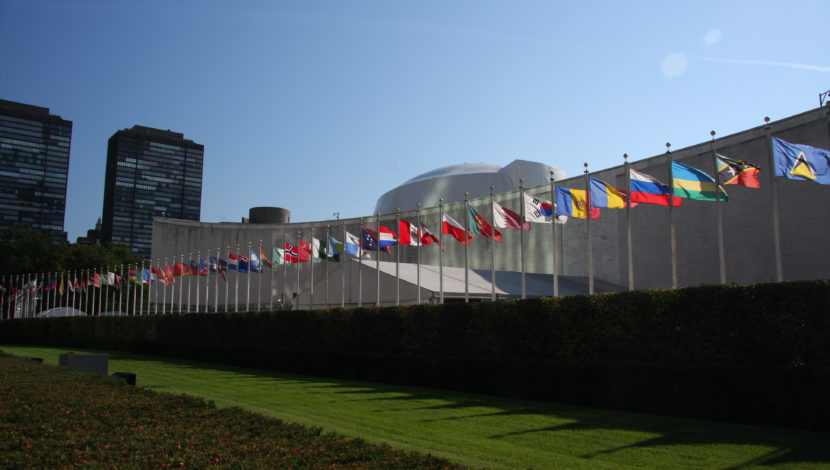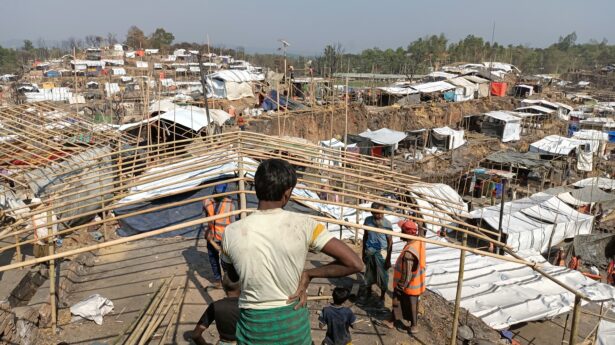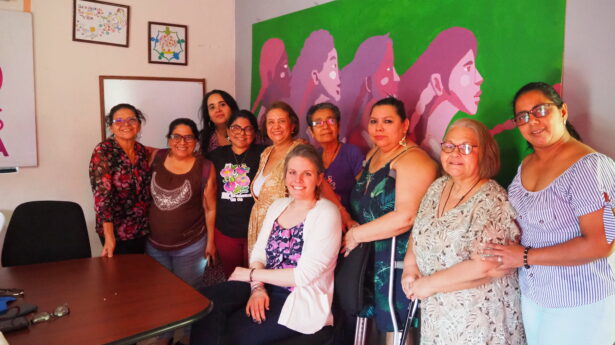The Unitarian Universalist Service Committee advances human rights through grassroots collaborations.
Celebrating the United Nations’ Promise of International Democracy

By on October 24, 2017
On this day in 1945, the Charter of the United Nations entered into force and with it, the world’s most meaningful and lasting opportunity to build a global democratic institution, in which all countries could have an equal voice.
Today, we celebrate this founding vision. In the midst of the largest refugee crisis on record, ethnic cleansing in Burma (Myanmar), conflict in Syria and elsewhere, and increasing global devastation due to climate change, the need to realize the United Nations’ promise is greater than ever. UUSC is calling on the U.S. government and all world nations to strengthen international democratic institutions and resist the siren call of nationalism and chauvinism which threatens our collective future.
A Shared Vision
UUSC was founded in 1939 to help refugees secretly evacuate from Europe as fascist regimes were driving millions of people into exile and laying the groundwork for the Holocaust and World War II. The founding of the United Nations in 1945 was meant to ensure that war, genocide, and forced displacement could never again take place on such a scale. UUSC has shared these values and worked with and through U.N. institutions and instruments to advance human rights ever since.
That legacy of collaboration continues today. From November 7 to 12, UUSC is traveling to Bonn, Germany for the 23rd Conference of the Parties (“COP23”). This annual convening, hosted by the U.N. Framework Convention on Climate Change (UNFCCC), keeps track of global progress on implementing compacts to reduce carbon emissions and mitigate climate change. The most important of these compacts is the Paris Accords, which 195 Parties to the Convention have signed and 168 have ratified, and from which the United States has disappointingly decided to withdraw.
Leveling the Playing Field
This year’s COP also marks the first time that a small Pacific Island nation, Fiji, will be presiding over the Convention. Fiji’s leadership at this meeting provides an especially important opportunity to amplify the voices of people who are experiencing the worst effects of human-induced climate change. COP23 will be a critical moment for UUSC’s partners in the Pacific and all those on the frontlines of the impact of climate change to confront the U.S. government for its ambiguous and immoral position on this critical issue.
“The people of the Pacific islands are impacted every day by the decisions that larger, industrialized nations and financial institutions make. But they have very little power and leverage when it comes to diplomatic negotiations,” says Salote Soqo, senior program leader for environmental justice and climate action. “The United Nations is one of the very few spaces where countries can enter on a somewhat level playing field, which makes Fiji’s presidency quite significant.”
Steps Backward
When the United States fails to honor its international commitments, it abandons its democratic values. The Trump administration’s plan to exit the Paris Agreement is only one example of how the United States has worked to undermine global cooperation, especially during times of increased xenophobia and isolationist rhetoric. Last week, the administration also announced its intention to withdraw from UNESCO, the U.N. cultural heritage agency. The White House’s previous budget proposals have likewise threatened devastating cuts to core U.N. institutions. Especially egregious, the Trump administration recently slashed its refugee quota to only 45,000 – the smallest share of the international resettlement obligation the United States has shouldered since its Refugee Program began in 1980.
International democracy means being accountable to the people all over the world who are impacted by one country’s decisions, regardless of where any person resides. The United States’ obligations as a world leader include supporting the global response to the refugee crisis, ending policies that actively contribute to climate change, and supporting adaptive strategies for communities on the frontlines of these crises that honor the dignity and agency of the people involved.
Expanding the Bounds of the Possible
The promise of the United Nations was that no national or governmental self-interest would come before the shared needs of the human community. Seventy-two years later, that promise survives. While the United Nations faces many obstacles to achieving its original vision, it remains the planet’s best hope for finding shared solutions that honor the needs and capacities of all Earth’s inhabitants, not just the most powerful.
UUSC and our partners still believe in the possibility of finding those solutions. “Our partners don’t use the term ‘climate refugee,’ for instance,” says Soqo, “because they know that there is still time to change what is happening to the planet. Doing so requires fundamental transformations to neoliberalism and colonialism and the other oppressive structures in which we relate to one another. But that doesn’t make it impossible.” On United Nations Day, we honor this wider vision of the possible. And we remember that the only way to get there is together.

